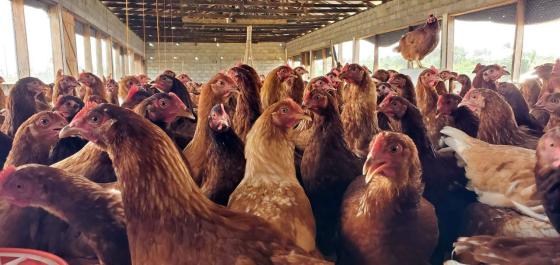Liberia: How This Farm Is Reshaping Liberia’s Poultry Industry

Poultry farms can play a very key role in improving livelihoods and food and nutrition security. In Liberia, however, poultry production still faces huge challenges, making the country largely dependent on foreign countries for poultry products.
According to 2021 statistics, Liberia imported US$43 million worth of poultry products, becoming one of the largest countries in the world for importing poultry meat.
Many poultry farmers in Liberia currently encounter challenges of high production costs due to feed purchases and the importation of day-old chicks.
Corn, also known as maize, is one of the grains used in the poultry diet, but it is grown by farmers in Liberia mainly for human food consumption and not for animal feed. As a result, poultry farmers have to rely on the importation of feed for their birds from neighboring countries.
The Serving Humanity for Empowerment and Development (SHED) farm sees the production of maize for the poultry sector in Liberia as an opportunity to unlock the potential of the sector.
With support from the German Federal Ministry for Economic Development (BMZ) through Welthungerhilfe (WHH) Liberia office, SHED Farm has established a feed mill with a capacity of 3 metric tons per hour to address poultry feed constraints.
The facility is situated in Mount Barclay, 35 kilometers away from Monrovia.
The Executive Director of SHED Farm, Joyce Pajibo, said that with the construction of the feed mill, the farm is to some extent not dependent on poultry feed from neighboring countries.
She said that the feed mill is currently helping to get feed supplies to other poultry facilities.
SHED Farm is one of the few poultry farms in Liberia that is striving to address animal feed challenges in the country.
“We are thankful to the German government for the level of support toward the farm project. Importing poultry feed costs us a lot as farmers in this country. We are working to improve the concentration of the feed to enrich the diet,” she said.
SHED is a local social enterprise that sprang out of Finn Church Aid (FCA), Finland's largest international aid organization. It was established in 2017 with the core mandate of implementing sustainable actions for human empowerment in the country.
Since its establishment, SHED has been supporting vulnerable women and youth through different intervention activities.
The poultry farm project still seeks support from the government and other international partners to address other challenges.
Under the Swedish funded project, “Promoting Sustainable Partnership for Economic Transformation (PROSPECTS) IV”, SHED Farm is hoping to expand the production of maize by supporting more women in order to enhance feed production.
Pajibo said under the project, they are working with 50 farmers, mainly women in Bong Mines, lower Bong County, to produce maize for the factory.
“We want to promote commercial maize production to unlock the potential of the local poultry industry. We are working with our partners to source improved corn seeds to supply to our beneficiaries,” she said.
However, Pajibo underscored the need for support toward mechanization in order to assist the beneficiaries in expanding the production of maize.
Before the establishment of farms like SHED, according to Pajibo, Liberia was importing 95% of its egg supply from outside, but now, the narrative is changing.
“Today, poultry farms in Liberia contribute 40% towards the egg market, and the rest is [imported]. We are working with several out-growers in communities to get fresh, organic eggs on the market,” she recently told donor partners.
According to her, the farm is now serving eggs to major hotels, supermarkets, and restaurants in and around Monrovia.
“We are working especially with women as out growers to develop their poultry businesses. We started this SHED farm with 2,000 birds, but today we have more than 15,000 birds,” she explained.
SHED has identified the need for local egg and maize production as an opportunity to help women in vulnerable households break the chains of poverty.
Pajibo also mentioned encouraging farmers to grow soya beans in order to improve the feed concentrate.
Soya bean is high in protein and an essential concentrate for poultry feed. Though the Liberian soil has been tested to be ideal for the growth of soya beans, the market is either lacking or limited.
